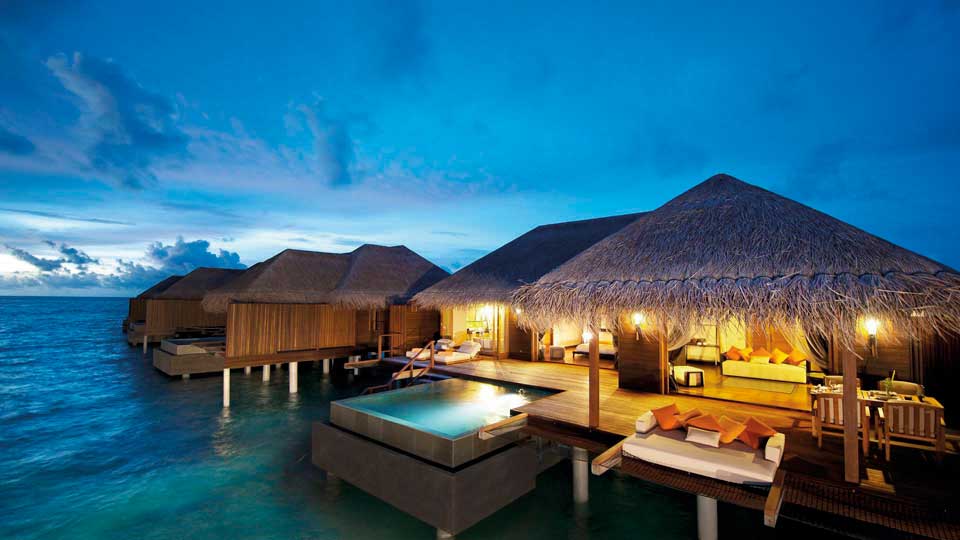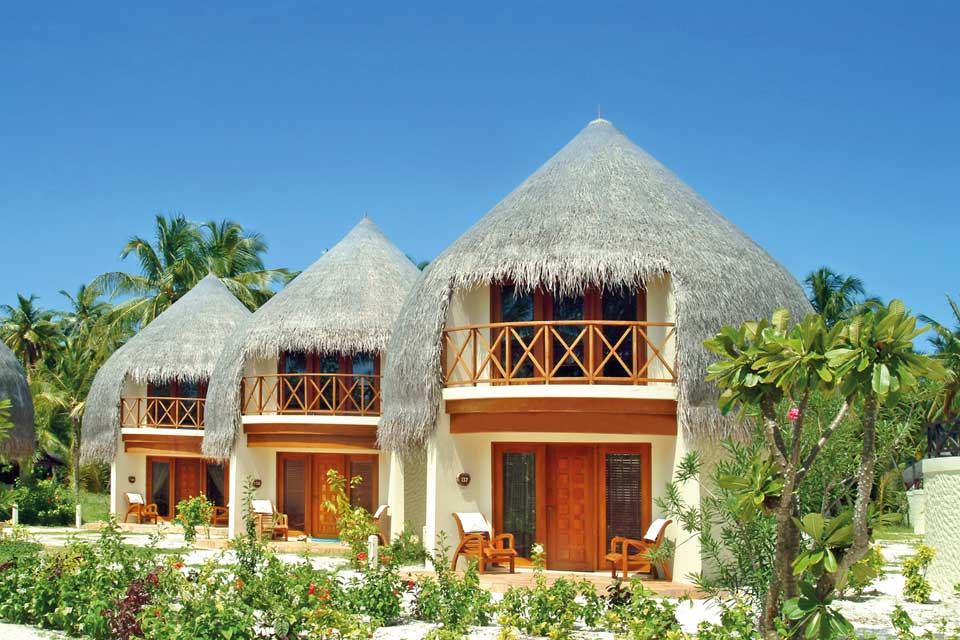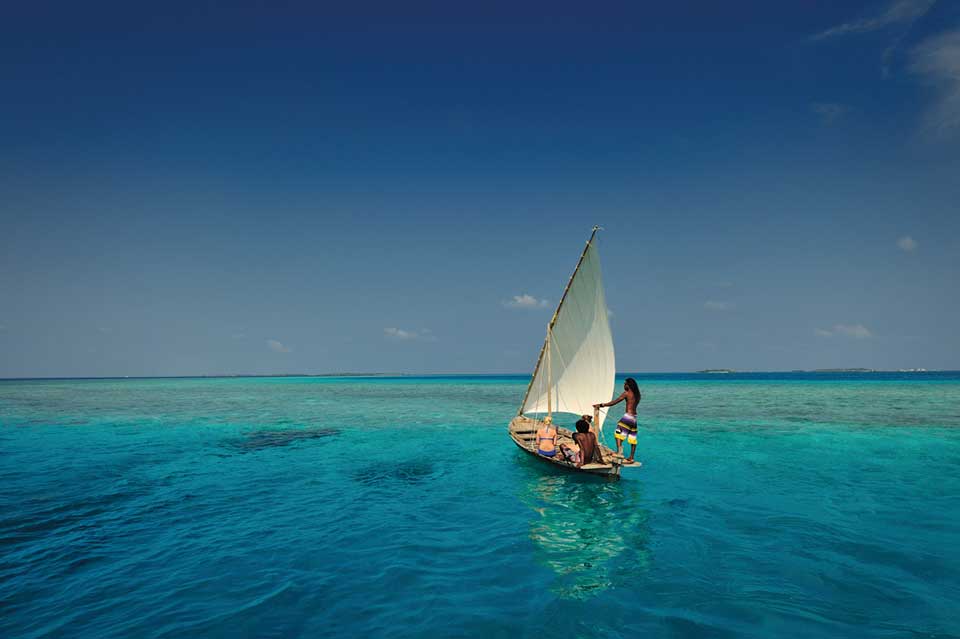
By Marie Scott
Whizzing along on the crest of a wave, wind in hair, sun and seaspray on face, aboard a gleaming speedboat must rank as one of the better ways to start a holiday, perhaps only bettered by that seaplane whizzing overhead.
The boat was how we approached the desert island, one of very many tiny coral atolls scattered across the Indian Ocean that make up the Maldives, and though the boat was great, the seaplane has old Hollywood appeal for the next time. Both options are open to those choosing to holiday on one of these idyllic islands. The Maldives has only recently started to become a tourist destination, being a particularly far-flung faraway place that entails lengthy flights. Arriving finally at the islands’ capital, Malé, it is but a few steps to the waiting speedboat or moored seaplane in the harbour for the final lap of the journey. However jet-lagged, this provides exhilarating stimulation to all but the most aquaphobic – who presumably won’t choose to go here on holiday anyway.
A few years back, the Maldives acquired sudden international attention when its government took drastic action to draw notice to a major problem. It staged a cabinet meeting beneath the waves, to emphasise the danger to the islands from rising sea levels.
We may have had soaked politicians in the past, but this provides a new level of immersion from which our own dear leaders might benefit.

The Maldivian ministers donned wet suits and oxygen tanks and entered the pristine waters, clutching their documents in waterproof holders, and communicated by hand signals and white boards. The aim was to draw world attention to the very real threat the rising waters have for the low-lying Maldivian islands, and to give extra urgency to the need for all nations to reduce their carbon emissions.
Whether it has had any effect is a moot point, perhaps the minutes got water-logged, but meantime the islands are thankfully keeping their heads above water.
Which is more than can be said for most visitors. They can’t wait to pull on snorkels, strap on tanks, and join the shoals of fish performing waterobics in the lagoon.
The waters around the islands – all 1,190 of them still there at the last count – teem with fish and coral, so that snorkelling and scuba diving are the main activities for holidaymakers. There is, in truth, little else to do, other than enjoy nice food, cocktails on the jetties, lazing by the sea and sauntering round the island – which may take all of 10 minutes. It suited us down to the nearest sun lounger but is clearly not the place for those who wish to be busy at museums, discos, karaoke bars or suchlike.
But recognising that some visitors may pall of this surfeit of lazing, the Bandos Island Resort, where we were staying, has laid on some diversions. Live evening entertainment in the main palm-roofed reception area included a Western pop singer, who had clearly been so affected by the laid-back atmosphere that his somnolent style drove us to drink – again; while a young, all-male local dance team gave a fantastically strong, riveting performance that should see them signed up by some visiting agent and appearing at the O2 any time soon.
“There were some Japanese visitors with us, equally delighted and admiring
and nearly dropping cameras into the sea in their enthusiasm”
Known as something of a honeymoon resort, we could only sympathise with the many young brides, and old ones too, who must have thought that this remote outpost would remove their spouses from the temptation to watch World Cup football. Was there a corner of the planet where the histrionics and accompanying hysterical commentaries did not reach? Happily, there were plenty of such spots from which to watch the ocean, while sipping a daiquiri, out of ear and eye-shot of the action.
Other activities on offer for those who can’t sit still include nocturnal fishing, island-hopping, and, best of all, a boat trip out to see dolphins. There could be no guarantee, of course, that the fish would appear on cue to perform for us, but boy, did they. The delight and excitement of seeing these wonderful creatures swooping and diving right alongside the boat, beneath the prow, and then executing spins and turns and nose-stands in a shameless display of showing-off was quite magical.
There were some Japanese visitors with us, equally delighted and admiring and nearly dropping cameras into the sea in their enthusiasm. It was tempting to ask how their own government could allow the regular mass slaughter of dolphins each year, but English reserve prevailed.

The Maldives was a British Protectorate up until the mid-1960s and is the country with the lowest natural highest point in the world – a somewhat baffling combination of extremes – at just 7ft 10in. Though waves within the lagoon are usually of the gentle sort, it is easy to understand native concerns about the possibility of being swamped, and indeed, this happened calamitously in the 2004 tsunami. The human toll was mercifully limited by comparison with other areas that were devastated, but the infrastructure was largely destroyed.
Hard to imagine that now, cocktail in hand, watching sharks on the prowl beneath us in spotlights from the jetty. They are, we were assured, of the friendly sort but even a flick from a tail might give a bit of a nasty jolt in passing, but otherwise they are no more dangerous than the sharks in downtown Soho.
For the tourist, this does indeed seem like Heaven-on-sea. The climate is balmy all year round, the sea as warm as a bath, there were no signs of bothersome insects and the small lizards that were everywhere soon scuttled out of sight.
With just under 200 of the islands inhabited, and some of those very sparsely, there is clearly plenty of potential to extend the tourist facilities they have, if they can keep the waves at bay. At present, resort hotels are limited to one per island, apart from Malé, home to the capital. And they are of a deluxe variety. Testament to the sophistication of one, the Shangri-La on Villingili, is that it has been included in the Wine Spectator’s Awards for the second year running for its outstanding wines.
That in turn is testament to the somewhat relaxed attitude the Maldivian government has adopted towards tourists. This is an Islamic country, no other religions allowed, but alcohol, bikinis and shorts are tolerated – yet there are signs warning against holding hands, public displays of affection, and topless bathing is strictly forbidden. The Maldives is not going to become an Eastern Magaluf.
We witnessed a few cuddles and kisses – must have been honeymooners – while some of the older guests did sedately hold hands, without anyone emerging from the bushes to arrest them. Like trade, tourism is great for breaking down barriers and softening rules, in the interests of the local economy. For the Maldives, where the government is not yet showing greater tolerance towards its indigenous population, this must be a good thing.








